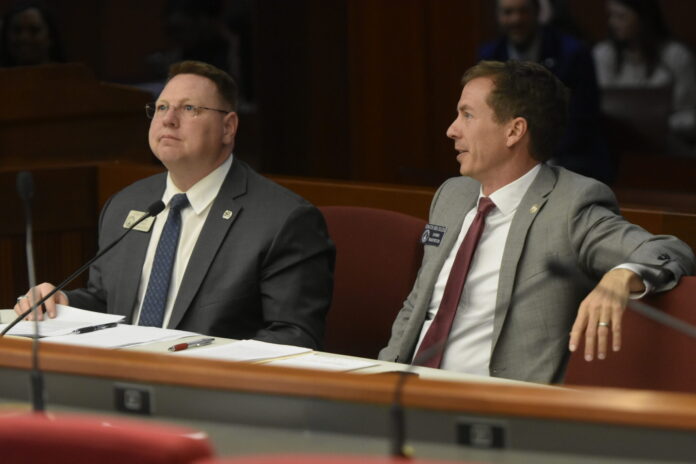
ATLANTA (Georgia Recorder) — A Senate bill aimed at barring transgender girls from playing on girls’ school sports teams passed a significant milestone toward becoming law Tuesday when it moved through a House committee on a party-line vote.
Cumming Republican Sen. Greg Dolezal’s Senate Bill 1 bars students who were designated male at birth from playing on teams for girls or women from K-12 through college in public and private schools. It also imposes gender-based restrictions on locker rooms, changing facilities and restrooms, with carve-outs for medical or training personnel at certain times.
“We recognize both biologically, anecdotally, and statistically, that there’s inherent male advantage when it comes to sports and we want to create a boundary around female sport that excludes that male advantage from being in female sport,” Dolezal said.
Schools that violate the ban could lose state funding.
It does not go as far as the House’s transgender sports ban, which also replaces the word “gender” with the word “sex” throughout state code, which LGBTQ advocates said could lead to unintended consequences for transgender Georgians from collecting health data to adopting foster children. That House bill is still alive, but author Rep. Josh Bonner, a Fayetteville Republican, indicated he was happy with the version of SB1 that passed Tuesday.
“I think the bill before you represents a good common sense compromise between the two measures, between the House and Senate,” he said.

Supporters said the bill is about fairness.
“Everybody has a place to compete in sports,” said Matt Sharp, an attorney with Alliance Defending Freedom, a conservative legal organization, “but the question is, what is the most fair way to do it? We don’t allow the senior in high school to play against the middle school students. We don’t allow the 220-pound student to wrestle against the 110-pound weight category, nor should we allow males to compete against females.”
Opponents characterized the bill as paternalistic and said it’s based on inaccurate stereotypes of transgender athletes.
“The idea that trans women are across the board faster, taller, and stronger than cis women is untrue,” said Evelina Pierce. “I’m one of the coaches on a professional team, cisgender women on our team have played against transgender women. It is inclusive, and this is partially because women have created the rules. I notice the people who are bringing forth these anti-trans bills are men. We need women to be actually creating the rules under which we play, not men. This bill is not about protecting women.”
Pierce coaches for Atlanta Soul, a professional ultimate – also known as ultimate Frisbee – team. Ultimate leagues are often gender-inclusive and welcoming to transgender and nonbinary members.
Kimble Sorrells, an ordained minister, characterized the bill and others like it as an exercise in ginning up the base with red meat bills.
“With so many Georgians struggling for things like just trying to get by and pay the bills, I really wonder why we’re focused on this, and it feels like this is really just political grandstanding and attempts to discriminate,” he said. “In the same way that it was never really about water fountains, I don’t really believe this is about women’s sports.”
Because it was amended, SB1 will need to pass both chambers before it can become law.
Several other bills that would restrict transgender Georgians’ rights are poised for action in the waning days of the 2025 legislative session. Bans on puberty-blocking drugs for transgender minors and gender-affirming treatments for both inmates in correctional institutions and workers on the state health insurance plan have passed the Senate and could be headed for votes in the House.
The end of the year’s session is set for April 4.







